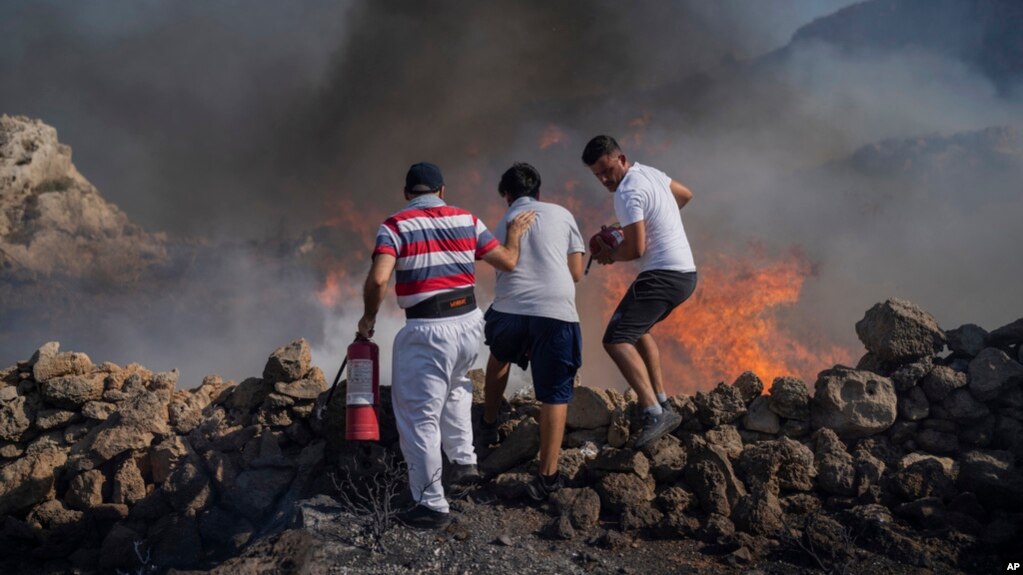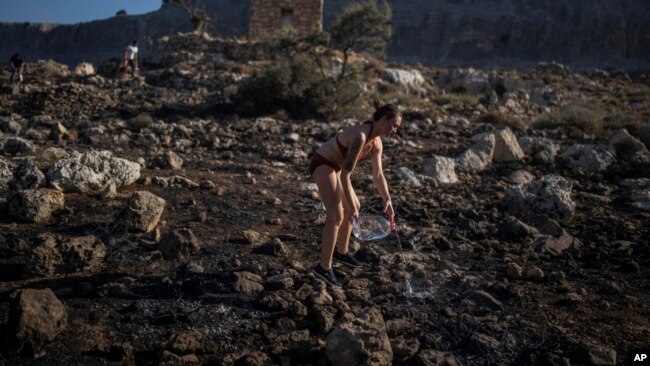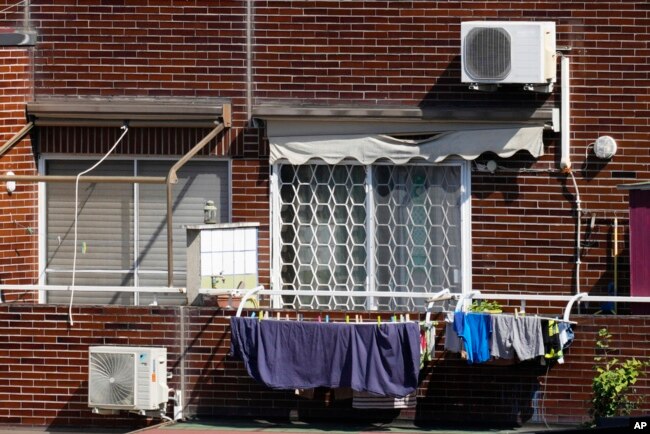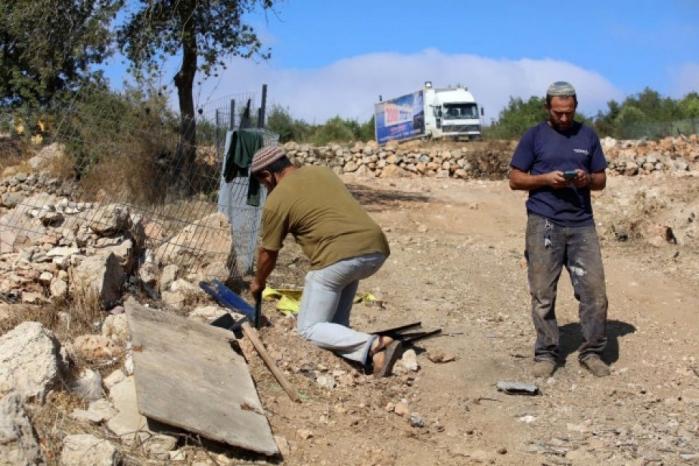August 06, 2023
Associated Press

Local residents try to extinguish a fire, near the seaside resort of Lindos, on the Aegean Sea island of Rhodes, southeastern Greece, on July 24, 2023.
RHODES, GREECE —
Tourists at a seaside hotel on the Greek island of Rhodes snatched up pails of pool water and damp towels as flames approached, rushing to help staffers and locals extinguish one of the wildfires threatening Mediterranean locales during recent heat waves.
The quick team effort meant that "by the time the fire brigade came, most of the fire actually was dealt with," said Elena Korosteleva from Britain, who was vacationing at the Lindos Memories hotel.
The next morning, some unsettled guests cut their holiday short — but most stayed on as the resort wasn't damaged in the small brush fire outside its grounds.
The Greek island known for sparkling beaches and ancient sites is nursing its wounds after 11 days of devastating wildfires in July. After thousands of people were evacuated during the height of travel season, Rhodes is weighing how the crisis will affect its vital tourism sector, which fuels most of its economy and some 20% of Greece's.
It's the same for other Mediterranean destinations, like Italy and Spain, where the tourism sector also is being hit by heat waves and wildfires. Greece, Italy, Algeria and Tunisia combined lost more than 1,350 square kilometers to blazes that affected 120,000 people in late July, according to European Union estimates. And Greece is expecting even more extreme heat in the coming days.
The mayor of Villardeciervos village, in part of northwestern Spain ravaged by fires last summer, said hikers are still coming.

RHODES, GREECE —
Tourists at a seaside hotel on the Greek island of Rhodes snatched up pails of pool water and damp towels as flames approached, rushing to help staffers and locals extinguish one of the wildfires threatening Mediterranean locales during recent heat waves.
The quick team effort meant that "by the time the fire brigade came, most of the fire actually was dealt with," said Elena Korosteleva from Britain, who was vacationing at the Lindos Memories hotel.
The next morning, some unsettled guests cut their holiday short — but most stayed on as the resort wasn't damaged in the small brush fire outside its grounds.
The Greek island known for sparkling beaches and ancient sites is nursing its wounds after 11 days of devastating wildfires in July. After thousands of people were evacuated during the height of travel season, Rhodes is weighing how the crisis will affect its vital tourism sector, which fuels most of its economy and some 20% of Greece's.
It's the same for other Mediterranean destinations, like Italy and Spain, where the tourism sector also is being hit by heat waves and wildfires. Greece, Italy, Algeria and Tunisia combined lost more than 1,350 square kilometers to blazes that affected 120,000 people in late July, according to European Union estimates. And Greece is expecting even more extreme heat in the coming days.
The mayor of Villardeciervos village, in part of northwestern Spain ravaged by fires last summer, said hikers are still coming.

People play with a ball in front of a burnt forest at a beach of Glystra, on the Aegean Sea island of Rhodes, southeastern Greece, on July 27, 2023.
"Tourism is bound to suffer a bit in the next few years, (whether) we like it or not," Rosa María López said. "On the hiking trails, there are no trees, and it is very sad to see. … But this area is still highly valued by tourists in spite of everything. We will have to adapt."
Fires have chased away tourists in hard-hit parts of Greece and Italy. Rhodes saw mass cancellations of flights and the trend is similar in Sicily, said Olivier Ponti, vice president of insights at ForwardKeys, a travel data company with access to airline industry ticketing data.
While travel to Greece overall has not been hit too hard, Italy isn't as lucky. Wildfires "have caused a slowdown in bookings for many Italian destinations, even places not close to the fires," he said, noting a drop for Rome in the last week of July.
Even without the flames, summer heat intensified by climate change can be a turnoff for travelers.
Hoteliers are worried in southeastern Spain's coastal resort city of Benidorm, a longtime favorite for British and Scandinavian tourists.
"If heat waves were to be repeated every summer, the impact on our economy would be significant," said Antonio Mayor, chair of the hotel and tourism association in the Valencia region, which includes Benidorm. "Our activity is centered on the three summer months."
That could mean tourists head north to Scandinavian countries or the United Kingdom instead.
"Record-setting temperatures in European countries such as Greece, Italy and Spain are not scheduled to ease up as we enter August, so it might be considered a much safer option to opt for a stay in northern Europe," said Tim Hentschel, CEO of digital booking platform HotelPlanner.
The World Meteorological Organization and the EU's Copernicus Climate Change Service calculated July to be the hottest month on record. Heat records foreshadow changes ahead as the planet warms, scientists say, including more flooding, longer-burning wildfires and extreme weather events that put people at risk.

"Tourism is bound to suffer a bit in the next few years, (whether) we like it or not," Rosa María López said. "On the hiking trails, there are no trees, and it is very sad to see. … But this area is still highly valued by tourists in spite of everything. We will have to adapt."
Fires have chased away tourists in hard-hit parts of Greece and Italy. Rhodes saw mass cancellations of flights and the trend is similar in Sicily, said Olivier Ponti, vice president of insights at ForwardKeys, a travel data company with access to airline industry ticketing data.
While travel to Greece overall has not been hit too hard, Italy isn't as lucky. Wildfires "have caused a slowdown in bookings for many Italian destinations, even places not close to the fires," he said, noting a drop for Rome in the last week of July.
Even without the flames, summer heat intensified by climate change can be a turnoff for travelers.
Hoteliers are worried in southeastern Spain's coastal resort city of Benidorm, a longtime favorite for British and Scandinavian tourists.
"If heat waves were to be repeated every summer, the impact on our economy would be significant," said Antonio Mayor, chair of the hotel and tourism association in the Valencia region, which includes Benidorm. "Our activity is centered on the three summer months."
That could mean tourists head north to Scandinavian countries or the United Kingdom instead.
"Record-setting temperatures in European countries such as Greece, Italy and Spain are not scheduled to ease up as we enter August, so it might be considered a much safer option to opt for a stay in northern Europe," said Tim Hentschel, CEO of digital booking platform HotelPlanner.
The World Meteorological Organization and the EU's Copernicus Climate Change Service calculated July to be the hottest month on record. Heat records foreshadow changes ahead as the planet warms, scientists say, including more flooding, longer-burning wildfires and extreme weather events that put people at risk.

Jaquelin Stocklein of Germany drops water to a burnt area during a wildfire near the seaside resort of Lindos, on the Aegean Sea island of Rhodes, southeastern Greece, on July 24, 2023.
With that in mind, U.S.-based climate technology startup Sensible Weather is developing insurance that would compensate people if extreme heat wrecks their holiday.
It's rolled out "weather guarantee" coverage to travel companies in the U.K., France and the U.S., which pays travelers if prolonged rain ruins their beach break or there's no snow for a ski trip.
Sensible Weather will soon add a heat cover option "in anticipation of next summer," founder Nick Cavanaugh said. "People are asking me about it more because they're thinking about these things more."
While people differ on how hot is too hot, "in the simplest version, if it was 42 degrees Celsius for three hours in the middle of the day and you couldn't go out and do an activity, we could give you some money back," he said.
Rhodes had expected foreign arrivals to increase 8%-10% over a bumper year in 2022, when about 2.6 million people flew to the Greek island, mostly from Britain and Germany. But after the fires, flight cancellations in the last week of July exceeded all bookings made in the equivalent week in 2019, said Ponti of ForwardKeys.
Manolis Markopoulos, head of the Rhodes hotel association, is optimistic that rebounding arrivals to parts of the island not damaged by flames can salvage much of the projected boost in tourism.
"Every day we're seeing more business," he said. "By Aug. 8-10, I think we'll be back to our normal pace at all these resorts," which account for about 90% of the island's 220,000 beds.
In damaged areas, "some brave tour operators have already decided to bring customers from this coming weekend," Markopoulos said. "These areas have a longer road before they return to normality — but they're not even 10% of the (island's) total capacity."
New bookings for future travel to Rhodes did take a hit, falling 76% the week of July 17, when the fires began, over the previous week. For Greece as a whole, they slumped 10%, Ponti said.
While some major British operators briefly canceled all Rhodes flights and holidays — offering refunds to people who'd booked for fire-hit areas — other budget airlines kept offering seats and reported normal travel figures, HotelPlanner's Hentschel said.
In Germany, leading travel operator TUI is again offering vacations to all parts of Rhodes after it stopped flying tourists in.
"We would do more damage to the people of Rhodes if no more tourists came now after the forest fires," TUI CEO Sebastian Ebel told Germany's dpa news agency.
Greek Prime Minister Kyriakos Mitsotakis offered an additional incentive, appearing on ITV's "Good Morning Britain" this week to promise people whose Rhodes vacations were spoiled by the fires a free week on the island next spring or fall.
Korosteleva, the Rhodes vacationer, said the blazes should motivate action against climate change.
"It makes people aware what we've caused to the planet, that this change may not be reversible. So it's not just about tourism," said Korosteleva, who heads the University of Warwick's Institute of Global Sustainable Development. "I think it actually clearly touches upon how we need to start acting now."
With that in mind, U.S.-based climate technology startup Sensible Weather is developing insurance that would compensate people if extreme heat wrecks their holiday.
It's rolled out "weather guarantee" coverage to travel companies in the U.K., France and the U.S., which pays travelers if prolonged rain ruins their beach break or there's no snow for a ski trip.
Sensible Weather will soon add a heat cover option "in anticipation of next summer," founder Nick Cavanaugh said. "People are asking me about it more because they're thinking about these things more."
While people differ on how hot is too hot, "in the simplest version, if it was 42 degrees Celsius for three hours in the middle of the day and you couldn't go out and do an activity, we could give you some money back," he said.
Rhodes had expected foreign arrivals to increase 8%-10% over a bumper year in 2022, when about 2.6 million people flew to the Greek island, mostly from Britain and Germany. But after the fires, flight cancellations in the last week of July exceeded all bookings made in the equivalent week in 2019, said Ponti of ForwardKeys.
Manolis Markopoulos, head of the Rhodes hotel association, is optimistic that rebounding arrivals to parts of the island not damaged by flames can salvage much of the projected boost in tourism.
"Every day we're seeing more business," he said. "By Aug. 8-10, I think we'll be back to our normal pace at all these resorts," which account for about 90% of the island's 220,000 beds.
In damaged areas, "some brave tour operators have already decided to bring customers from this coming weekend," Markopoulos said. "These areas have a longer road before they return to normality — but they're not even 10% of the (island's) total capacity."
New bookings for future travel to Rhodes did take a hit, falling 76% the week of July 17, when the fires began, over the previous week. For Greece as a whole, they slumped 10%, Ponti said.
While some major British operators briefly canceled all Rhodes flights and holidays — offering refunds to people who'd booked for fire-hit areas — other budget airlines kept offering seats and reported normal travel figures, HotelPlanner's Hentschel said.
In Germany, leading travel operator TUI is again offering vacations to all parts of Rhodes after it stopped flying tourists in.
"We would do more damage to the people of Rhodes if no more tourists came now after the forest fires," TUI CEO Sebastian Ebel told Germany's dpa news agency.
Greek Prime Minister Kyriakos Mitsotakis offered an additional incentive, appearing on ITV's "Good Morning Britain" this week to promise people whose Rhodes vacations were spoiled by the fires a free week on the island next spring or fall.
Korosteleva, the Rhodes vacationer, said the blazes should motivate action against climate change.
"It makes people aware what we've caused to the planet, that this change may not be reversible. So it's not just about tourism," said Korosteleva, who heads the University of Warwick's Institute of Global Sustainable Development. "I think it actually clearly touches upon how we need to start acting now."





















